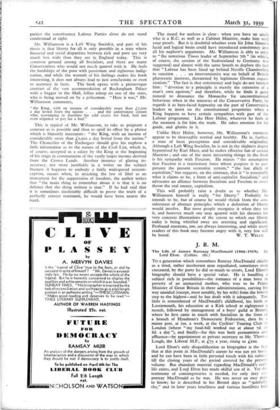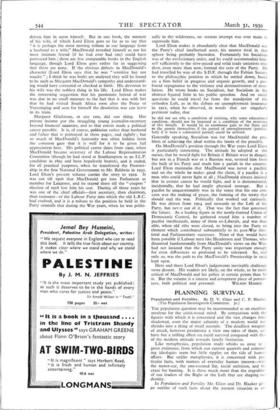J. R. M.
The Life of James Ramsay MacDonald (1866-1919). By Lord Elton. (Collins. 18s.) To a generation which remembers Ramsay MacDonald chiellti as a tired, rather incoherent man repudiated, sometimes even execrated, by the party he did so much to create, Lord Elton's biography should have a special value. He is handling a subject rich in possibilities—the romance of a man born in poverty of an unmarried mother, who rose to be Prime Minister of Great Britain in three administrations, carving his way unaided (except, most notably, by his wife) from the lowest step to the highest—and he has dealt with it adequately. Too little is remembered of MacDonald's childhood, his birth at Lossiemouth, his education at a Kirk school at eightpence a month, followed by management of a boys' guild at Bristol, where he first came in touch with Socialism in the form of a branch of Hyndman's Democratic Federation, then by a minor post, at Los. a week, at the Cyclists' Touring Club in London (where " my food-bill worked out at about 7d. or 8d. a day "), and finally—for this was both permanence and affluence—by appointment as private secretary to Mr. Thom. Lough, the Liberal M.P., at £75 a year, rising to Doo.
Lord Elton's only disqualification as biographer is the fact that at this point in MacDonald's career he was not yet born, and he can have been in little personal touch with his subject till the closing years of the period covered by the present volume. But abundant material regarding MacDonald's early life exists, and Lord Elton has made skilful use of it. Yet the testimony of contemporaries is needed, for only they can portray MacDonald as he was. He was never an easy man to know; he is described in his Bristol days as " roinfullY shy," and in later years loneliness and various hostilities bad
driven him in upon himself. But in one book, the memoir of his wife, of which Lord Elton goes so far as to say that " it is perhaps the most moving tribute in our language from a husband to a wife," MacDonald revealed himself as not his most intimate friend (if he had ever had one) could have portrayed him ; there are few comparable books in the English language, though Lord Elton goes rather far in suggesting that there are none. If the obvious defects in MacDonald's character (Lord Elton says that he was " sensitive but not touchy " ; I think he was both) are analysed they will be found to be such as Margaret MacDonald's sympathy and understand- ing would have corrected or checked at birth. His devotion to his wife was the noblest thing in his life. Lord Elton makes the interesting suggestion that his passionate hatred of war was due in no small measure to the fact that it was with her that he had visited South Africa soon after the Peace of Vereeniging and seen for himself the desolation war can leave in its train.
Margaret Gladstone, at any rate, did one thing. Her private income put the struggling young journalist-secretary beyond financial anxieties, and to that extent made a political career possible. It is, of course, politician rather than husband and father that is portrayed in these pages, and rightly ; but so much of MacDonald's humanity was often hidden from the common gaze that it is well for it to be given full appreciation here. His political career dates from 1900, when MacDonald became secretary of the Labour Representation Committee (though he had stood at Southampton as an I.L.P. candidate in 1895 and been hopelessly beaten), and it ended, for all practical purposes, - when he transferred the Premier- ship in the first National Government to Mr. Baldwin in 1935. Lord Elton's present volume carries the story to 1919. It was not till 1906 that MacDonald got into Parliament as member for Leicester, and he stayed there till the " coupon election of 1918 lost him his seat. During all those years he was one of the chief officials—first secretary, then chairman, then treasurer—of the Labour Party into which the old L.R.C. had evolved, and it is a tribute to the position he held in the Party councils that during the War years, when he was politi- tally in the wilderness, no serious attempt was ever made to supersede him.
Lord Elton makes it abundantly clear that MacDonald was the Party's chief intellectual asset, his nearest rival in that sphere being probably Snowden. Fortunately his Socialism was of the evolutionary order, and he could accommodate him- self sufficiently to the slow-paced and solid trade unionists who then, even more than now, formed the core of the Party. He had travelled by way of the S.D.F. through the Fabian Society to the philosophic position in which he settled down, based on a firm belief in progress and organic growth, and a pro- found repugnance to the violence and destructiveness of revo- lution. He wrote books on Socialism, but Socialism in the abstract figured little in his public speeches. And on social questions he could travel far from the standpoint of the orthodox Left, as in the debate on unemployment insurance in 1911, when he observed, in words that are singularly pertinent today, that he did not see why a condition of training, why some educational condition, should not be imposed as a condition of the receiving of this benefit. It would be an enormous gain to the State and to the people themselves if the period of unemployment (particu- larly if it were a substantial period) could be utilised.
Generally speaking, Socialism was for MacDonald the pro- blem of achieving the ideal within the limits of the possible.
On MacDonald's position through the War years Lord Elton is particularly interesting. The attitude he adopted at the outset, that he would fight for Britain if Britain were in danger, but not in a French war or a Russian war, severed him from the bulk of his Party and made him a pariah in the country. Lord Elton maintains that MacDonald was never a pacifist, and on the whole he makes good the claim, if a pacifist is a man who could never fight at all ; MacDonald always insisted that in certain causes he would fight, and it is demonstrated, incidentally, that he had ample physical courage. But a pacifist he unquestionably was in the sense that his one con- cern was the making of peace, the framing of the treaty that should end the war. Politically that worked out curiously.
He was driven from 1914 and onwards to the Left of his Party, but never out of it. That was the fact that governed the future. As a leading figure in the newly-formed Union of Democratic Control, he gathered round him a number of pacifist intellectuals, many of them ex-Liberals, and was thus
able, when old rifts were closed, to bring into the Party an element which contributed substantially to its post-War elec- toral and Parliamentary successes. None of that would have been possible if Labour men like Henderson and Thomas, who dissented fundamentally from MacDonald's views on the War, had not insisted that the Party unity was important enough for even differences so profound to be tolerated. So, and only so, was the path to the MacDonald's Premiership in 1924 kept open.
Here and there Lord Elton's judgements inevitably challenge some dissent. His readers are likely, on the whole, to be more critical of MacDonald and his policy at certain points than he is. But the volume is a sincere and competent piece of portrai-
ture, both political and personal. WILSON HARRIS.



































































 Previous page
Previous page